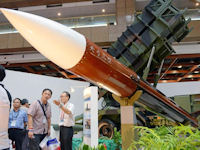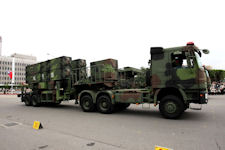Sky Bow III / Tien Kung III
The Tien Kung III (Sky Bow III) surface-to-air missile system was developed by the Chungshan Institute of Science and Technology to counter tactical ballistic missiles. The Tien Kung III SAM is based on the earlier Tien Kung 1 and 2 and is similar in configuration. This missile makes use of the Chang Bai (Long White) mobile phased-array radar and is said to have a performance similar to that of the Patriot PAC-2. The new weapon would replace aging Hawk missile systems and be deployed for air defense missions and missile interception and homeland defense combat operations. The Tien Kung III will strengthen the density of Taiwan's anti-aircraft network and close some of the gaps in its middle- and long-range air defense capabilities. As of 2014 Taiwan’s military plans to spend NT$74.8 billion (US$2.5 billion) in the next nine years on anti-missile systems.
Taiwan's 10 October 2006 National Day celebrations, including a speech by President Chen to senior officials, had a partisan slant but produced no major "surprises." In his speech, President Chen highlighted the recent application to the UN under the name "Taiwan" and the importance of referenda, including the DPP's UN referendum, and he defended his administration's economic performance against opposition naysayers. Chen then joined guests outside the Presidential Office Building (POB) to view a military parade, the first in 16 years, that displayed publicly for the first time the Taiwan-developed Hsiung-feng III supersonic antiship missile, the Tien-kung III surface-to-air anti-tactical ballistic missile, and an unmanned aerial vehicle (UAV).
The system was expected in 2007 to begin flight testing mid-2008. As of 2010 it was reported that Taiwan planned to introduce an advanced version of the indigenous SAM known as Tien Kung-III. (TK-3) some time after 2011. This system has not been offered for export.
In April 2012 media reports alleged that two advanced anti-missile systems — the Patriot Advanced Capability-3 (PAC-3) and Tien Kung-III “Sky Bow” (TK-III) air defense systems — had been deployed in eastern Taiwan to deal with the possible launch of a North Korean rocket later in the month.
Taiwan's military on 01 September 2014 denied a local media report earlier in the day that the locally developed Tien Kung III (Sky Bow III) surface-to-air missile system will be deployed on the country's Kidd-class destroyers. The report is not true, said the Chungshan Institute of Science and Technology, under the Ministry of National Defense, which developed the missile system. The Chinese-language Liberty Times reported Monday that the military is planning to improve the missile system on the Kidd-class destroyers, which are currently equipped with the U.S.-made surface-to-air Standard Missile-2. The newspaper said that the military was planning to deploy the Tien Kung III system on the destroyers to bolster the vessels' combat capabilities.
When President Tsai Ing-wen met with the winners of the first National Defense Science and Technology Contribution Award on 14 December 2023, she revealed that the Chinese Academy of Sciences’ research and development of missile weapon systems had successfully passed the initial operational evaluation and can effectively counter missiles that change trajectories. This development allows Taiwan's air defense weapon system to keep pace with advanced countries. In addition to enhancing its independent national defense capabilities, it also improves the effectiveness of air defense operations.
Tsai Ing-wen met with the winners of the "Executive Yuan National Defense Science and Technology Contribution Award 2023" in the morning. First, she congratulated Lin Juncun, director of the System Development Center of the Chinese Academy of Sciences, and the Chinese Academy of Sciences team for winning the first "Executive Yuan National Defense Science and Technology Contribution Award." She said that over the years, the government has actively promoted national defense independence, and the Chinese Academy of Sciences has led national defense science and technology research and development, combined with the industrial standards of domestic industry, academia and research institutions, to drive the development of the national defense industry and complete the supply chain.
Tsai Ing-wen pointed out that Director Lin and all partners play a very important role in this. Thanks to everyone's efforts, many key technologies have been overcome in the development of missile weapon systems, and they have successfully passed the initial combat evaluation and can effectively counter missiles with changing orbits. This progress allows our air defense weapon systems to keep pace with advanced countries. In addition to enhancing our national defense independent capabilities, it also improves the effectiveness of air defense operations.
Tsai Ing-wen said that with everyone's teamwork, the Tiangong III weapon system has also achieved breakthrough development, not only achieving mass production deployment, but also shortening the acquisition period, reducing costs, and promoting the development of domestic industries and employment opportunities. These tasks are full of challenges and require a lot of patience and persistence to complete. They are really not easy.
Finally, Tsai Ing-wen once again thanked Director Lin and every partner in the team for their dedication, and hoped that through this award, more outstanding talents would be inspired to invest in national defense scientific research and promote industrial development. I believe that in the future, with the joint cooperation of all parties, the pace of national defense independence will become more and more stable. "Let us work together to protect national security."
On 13 December 2023the first Executive Yuan National Defense Science and Technology Contribution Award was presented to Lin Juncun, director of the Department Development Center of the National Sun Yat-sen Academy of Sciences. Lin Juncun has been involved in the Tiangong project for 35 years, and has led and participated in the research and development of multiple missile weapon systems. He is also the promoter of mass production of the Tiangong III weapon system.
Executive President Chen Jianren, accompanied by Executive Councilor Luo Bingcheng and Defense Minister Qiu Guozheng, attended the "2023 Executive Yuan National Defense Science and Technology Contribution Award" award ceremony held in the Executive Yuan Auditorium. In order to commend those who have made significant contributions to the development of national defense science and technology or industry, in order to promote the cultivation of cutting-edge scientific and technological talents and improve the effectiveness of national defense scientific research and industrial development, the Executive Yuan administers the Executive Yuan National Defense Science and Technology Contribution Award. This year is the first one, and the winner is Lin Juncun .
Chen Jianren said that Lin Juncun led and participated in the research and development of multiple missile weapon systems. He led the team to use composite technology for the first time to improve the overall maneuverability of missiles in thin air. In the fire control radar part, he also used Taiwan's semiconductor technology strengths to successfully Develop a new active electronically scanned phase array radar, equipped with independently developed software. Both the software and hardware are independently developed.
He said that this radar can predict ballistic missile interception points, improve domestic ballistic missile interception technology, and eliminate the past dilemma of key radar technologies being controlled by outsiders. It will make a key contribution to improving the functionality of weapon systems and national defense independence.
Chen Jianren said that Lin Juncun was also responsible for the mass production of the Tiangong III weapon system. Through systems engineering methods, he integrated cross-domain technologies and broke through the bottlenecks of key technologies, making the weapons easy to produce and manufacture, and smoothly advancing from research and development to In the mass production stage, it also makes a significant contribution to shortening the weapon system acquisition period and reducing costs.
Chen Jianren said that Taiwan has long been subject to international political uncertainty. Based on the belief in protecting the country, the government has actively promoted national defense independence in recent years, through cultivating cutting-edge scientific and technological talents, opening up key technologies, and establishing industrial supply chains to improve the ability of independent research and development of weapons systems. In line with its capabilities, the national military is also committed to the requirements of domestically-made aircraft, domestically-made ships, ground equipment, drones, and precision weapons to drive industrial development and gradually achieve the goal of independent national defense.
Chen Jianren said that improving the capacity of national defense science and technology requires cooperation from all walks of life across the country. He also hopes that this award will encourage more researchers and developers and attract more scientific and technological elites to invest in the field of national defense research.
Lin Juncun said that he has participated in the Tiangong Project of the Chinese Academy of Sciences for 35 years, during which he has witnessed the progress of national defense science and technology. The Chinese Academy of Sciences started by reverse engineering foreign weapons, and today it can independently design, verify, test, and manufacture various types of advanced weapon systems, getting rid of the troubles of foreign weapons components being restricted, and confirming Taiwan's independent defense capabilities. He said that he hopes to continue to deepen the development of national defense technology so that in the future, what the national military will hold, see, and sit on will be high-quality and high-performance weapon systems made in Taiwan.
|
NEWSLETTER
|
| Join the GlobalSecurity.org mailing list |
|
|
|



